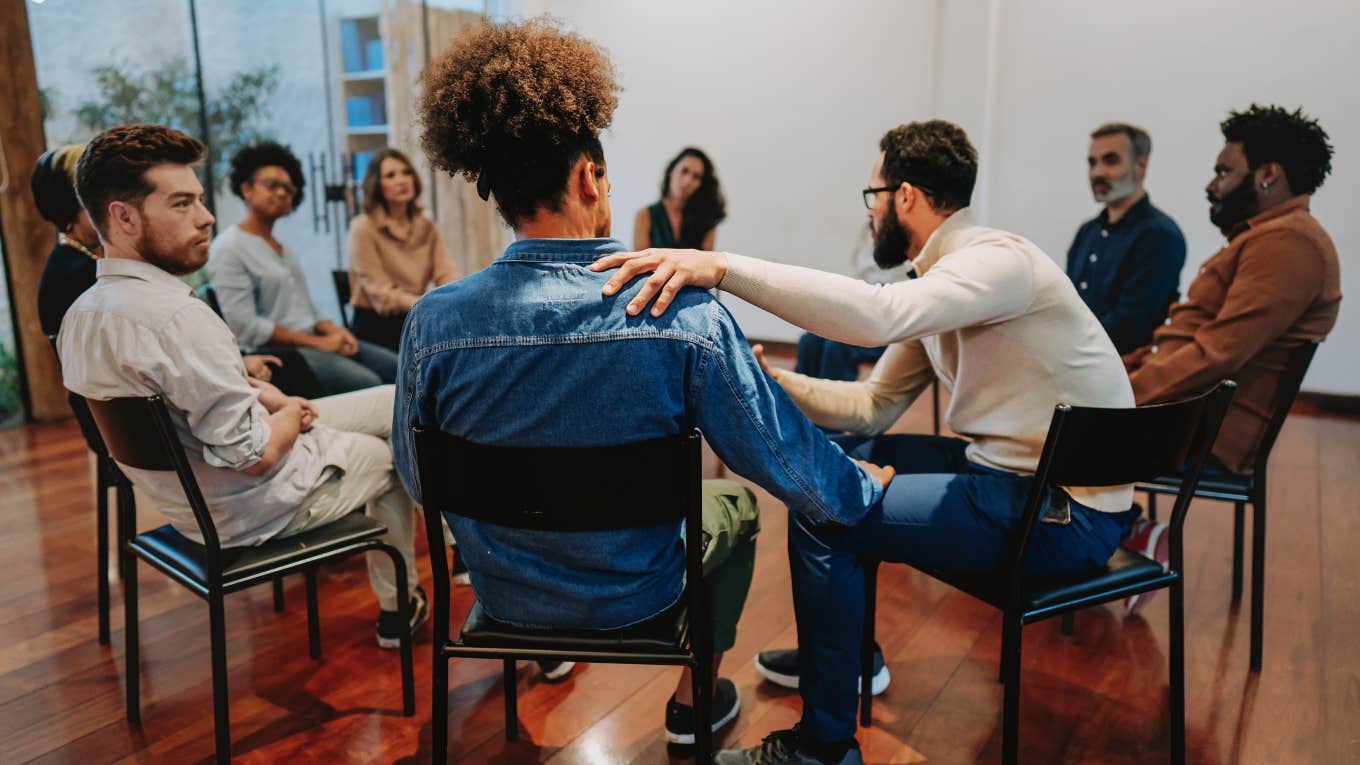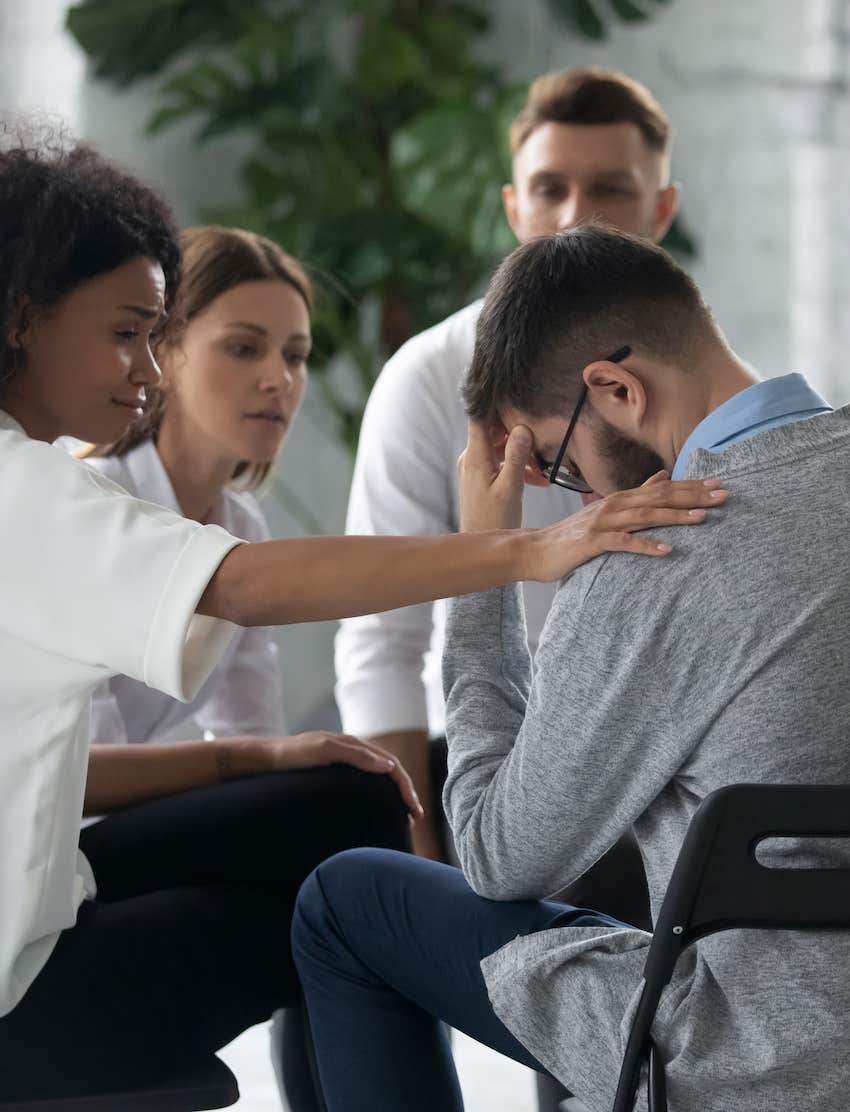6 Ways To Find Support When You Can't Afford Therapy
From do-it-yourself solutions to ways to find affordable therapists, a counselor shares her best tips.
 andreswd | Canva
andreswd | Canva Can you get affordable therapy? The answer is yes ... sort of. Many places offer low-cost psychotherapy, but there are also many ways to get support around self-growth that cost nothing.
First, I need to share how I am defining "therapy" versus "psychotherapy". Psychotherapy is when you meet one-on-one with a licensed therapist (Ph.D., MSW, LMFT, LPC, etc) who helps you recognize thought patterns, diagnose mental illness, and provide treatment in the form of talk therapy — perhaps utilizing body therapy as well.
Therapy, on the other hand, can take place any time you gain perspective on your thoughts, actions, or reactions. This kind of therapy happens through talking, reading, writing, dancing, or meditation. Here are a few of my favorite suggestions where I have found inspiration, healing, and space for quiet reflection for myself and my clients.
Here are 6 ways to find support when you can't afford therapy
1. AA, Al-Anon, Alateen, and ACOA
These are wonderful resources. Alcoholics Anonymous, Al-Anon, Ala-teen, and Adult Children of Alcoholics (ACOA) provide free groups (donations gently suggested) to support and educate people suffering from addiction as well as their families, spouses, children, and loved ones. Most of these groups are open, which means you can listen without fear of being called on to talk or tell your story.
The Al-Anon groups focus on boundary setting in relationships. This idea is critical and many of us need tutorials, examples, and support as we work to set our boundaries. And addiction takes many forms which means that more of us qualify as being in a relationship with an "addict" than we might want to admit.
Check out the information available on Al-Anon’s website and attend a group to learn about healthy boundaries.
2. Yoga classes
Whether at a recreation center, a fancy yoga studio, or an online tutorial, yoga classes can be a wonderful place for introspection, reflection, and learning how to set an intention. While these classes are not free (many online resources are available for free) I am including this in my list because most people at a yoga class are there for a workout and the therapy is an unexpected bonus.
In many classes, the teachers will ask you to set an intention for yourself (an emotional, professional, interpersonal, or physical goal). Then, they teach you how to focus your mind to corral your wild thoughts through your breath and movement.
You might be surprised by the insights that unfold from within when you spend an hour just breathing. During this hour, your mind is sharply focused on poses and softly focused on the intention you set.
3. Social media
Social media is a powerful tool to bring communities together. If you search for support groups for depression, marital issues, anxiety, or neck pain, you will find many wonderful resources. You might also find some bogus sites that are trying to sell you pants, but with some research, you will find some fantastic communities.
Many of these social media groups are private — meaning you will need to apply to become a member. Once connected, this is a great way of finding support and resources from people globally who are wrestling with similar issues.
4. Expert newsletters
Many websites offer daily or weekly newsletters about their product or message. As you research for inspiration, you might find authors are happy to put information in your inbox. Many will try to sell you products or services but many couch their sales pitch in useful, inspirational, and reflection-inducing articles.
There are as many of these as you can imagine, written by psychotherapists like Dr. Patricia O'Gorman, yoga and other spiritual-based healing arts professionals, like The Daily Om, and many more.
I particularly like when a newsletter or support site sends out brief daily emails filled with reminders of how to use their tools. I think we all change slowly and we need something each day to remind us of who we are trying to become and of the better self that we are trying to be in the world and our relationships.
5. Daily or weekly journals or planners
Panda Planner's Weekly Mental Health Planner is one example of a daily journal or planner that does more than a simple notebook can. It has sentence fragments that you complete each day to guide you to set your intentions and remind you of your daily focus. All of these will put you in a healing frame of mind.
There are also workbooks for self-help books that can be immensely helpful, like Dr. Sue Johnson's Hold Me Tight for couples or The Mindful Self-Compassion Workbook. On the more spiritual side, A Course In Miracles offers options that include a workbook for readers.
The goal is to fill it out first thing in the morning — before you start your day. It is amazing what setting expectations can do when used cumulatively. You don’t need to purchase a planner for this — you absolutely can use a blank notebook or your computer.
However, I find that it is easier if the questions and sentence fragments are already set up for you. It is a gentle push in the positive growth direction.
 Daniel Hoz via Shutterstock
Daniel Hoz via Shutterstock
6. Low-Cost Psychotherapy
I realize this listing is not about free therapy but I wanted to include a blurb for "psychotherapy" as well. A wonderful place to find quality low-cost psychotherapy is to go through universities or post-graduate institutes that are training psychotherapists. Many of the therapists on staff are graduates and not current students and many are experienced therapists who working on obtaining advanced degrees or certifications in specific theories or techniques. These therapists are also highly supervised which results in quality care.
Here in Boulder, CO, we have Naropa University which is a wonderful place for healing. When I was practicing in Washington, DC, I referred many people to the Institute of Contemporary Psychotherapy and Psychoanalysis (ICP&P). ICP&P has a wonderful referral network for low-cost therapy. It may take a little searching but fantastic low-cost therapy is available.
There are also online sources that offer affordable therapy, but they deserve some due dilligence before handing over your credit card.
 fizkes via Shutterstock
fizkes via Shutterstock
There are many avenues to healing and there is no "one size fits all" for personal growth. You might need to try many different avenues of healing before you find relief.
Don’t let your financial resources stop you from moving forward in your life or from seeking help. There are so many ways to experience healing, relief, and growth and the right one is just a click away. Have faith, do your research and please reach out if you have any questions.
Ashley Seeger, LCSW, is an experienced couples counselor who specializes in working with couples as they move through life transitions.

